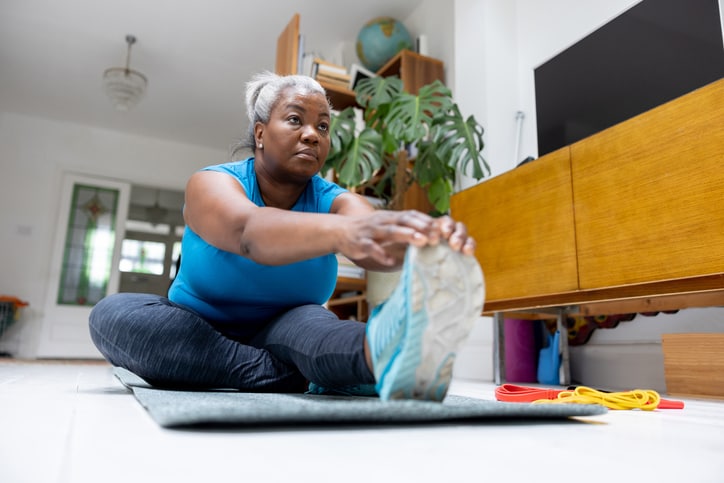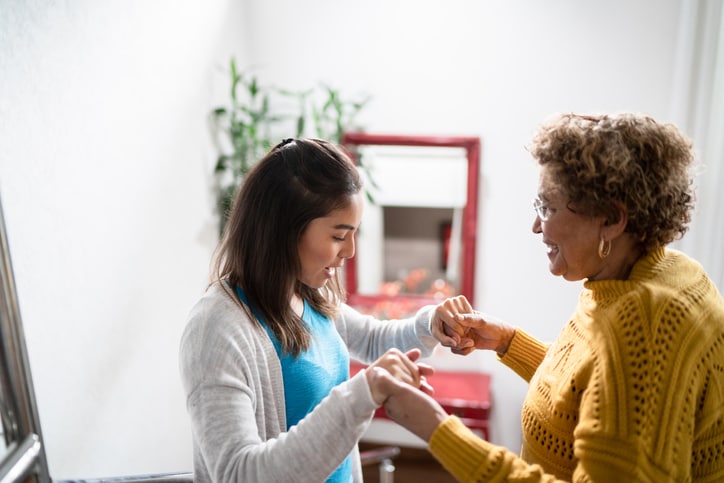No matter how far along we get in this global pandemic, it remains challenging to get a grip on everyday routines. Figuring out what to do in the case of an emergency, particularly one involving a senior, can be even more confusing. Faced with concerns around not only your loved one’s general health but the fact that they are at higher risk of COVID-19, you might be wondering whether it’s safe to take your loved one to the hospital.
We spoke to experts to answer family caregivers’ top questions on seeking emergency care during the pandemic.
What should I prepare ahead of time in case of an ER visit?
-
Identify the hospital you plan to go to.
-
Download any apps they might have that make it easy to track emergency room wait times.
-
Research and familiarize yourself with the hospital’s current ER procedures, which will generally be published and updated on their website.
-
Record baselines for your loved one’s heart rate, blood pressure, temperature and oxygen saturation.
-
Have a list of your loved one’s medications and any recent laboratory test results on hand.
Is it safe for my loved one at the hospital?
All of the experts we spoke with unequivocally agreed that hospitals around the U.S. are going above and beyond to ensure a safe environment for all patients. “Yes, there are risks involved in anything, and certainly some increased risk of exposure to COVID-19 in a healthcare setting,” acknowledges Dr. Scott Kaiser, a geriatrician and director of geriatric cognitive health for Pacific Neuroscience Institute at Providence Saint John’s Health Center in Santa Monica, California. “In the case of a true medical emergency, the very real risks of not getting appropriate care far outweigh any potential risks of COVID exposure. In other words, if you need to go to the emergency room, you should.”
Based on the opinions of the same experts, you can be assured that medical facilities are taking the following infection-control precautions:
-
Use of personal protective equipment (PPE).
-
Regular hand-washing.
-
Separating patients into different waiting areas, depending on their symptoms.
-
Screening for COVID-19 signs and symptoms at all entrances.
-
Frequently cleaning and disinfecting areas and high-touch surfaces.
-
Enforcement of social distancing.
-
Ongoing staff education and training.
-
Universal masking for all individuals over the age of 2.
-
Immediate isolation of anyone with COVID symptoms.
-
Providing hand sanitizer and masks to ER visitors and their family members.
Plus, in order to find care as quickly and efficiently as possible, many hospitals now have apps online to help you better understand wait times particularly in emergency departments, says Dr. Valerie Sauda, the chief nurse administrator and an assistant professor at Husson University’s School of Nursing in Bangor, Maine.
What symptoms indicate an ER visit?
Ultimately, this is a decision that requires balancing risk versus benefit, advises Dr. Carmel Dyer, a geriatrician with UT Physicians and UTHealth in Houston. “An important way to determine if a visit to the emergency room is needed is if the vital signs are abnormal,” she says.
Beyond that, the following symptoms are a case for going to the ER, says Gail Trauco, a registered oncology nurse in Atlanta:
• Chest pain.
• Difficulty breathing.
• Severe bleeding or trauma.
• Loss of consciousness.
• Loss of or blurred vision.
• High, uncontrolled fever.
• Head injuries.
• Burns.
• Severe abdominal pain.
• Broken bones.
How should I proceed once I’ve assessed my loved one’s symptoms?
Your first point of contact should be the senior’s doctor, says Trauco. Prep for your call by writing down your concerns and symptoms, then gathering their medications and any past laboratory test results. “This will allow the physician to make a rapid best clinical assessment and determine if the ER is the next step,” she notes.
If you will be heading to the ER, Dyer adds that it can be helpful to have your loved one’s physician call ahead before you arrive. “This may prevent unnecessary tests or procedures and save the emergency room physician time in getting to the root of the problem and starting treatment,” she says.
If you’re unable to connect with your loved one’s regular doctor or an on-call physician, or you feel you don’t have time to spare, you might want to proceed to the ER directly. In that case, Trauco recommends calling the hospital first to get the details on their process for patient arrival.
What should I bring with me to the hospital?
Kaiser recommends that family caregivers have ready access to the following background information upon arriving in the ER:
-
A current list of medical conditions, medications being taken, and allergies.
-
Names and numbers of current healthcare providers (primary care and other specialists).
-
Health insurance cards.
-
Copies of healthcare advanced directives.
-
A “personal information sheet” that provides more information about your loved one and their needs, especially as related to communication with information about language, hearing, visual or other sensory limitations, family contacts, etc.
Will I be able to stay with my loved one at the hospital?
Though hospital policies on this differ, many are working hard to ensure that the primary caregiver is able to be with a loved one if they need to go to the hospital, says Sauda.
In the case that your loved one has dementia or a sudden change in mental capacity: They will need to have you with them to advocate for them, says Dyer. “If you’re facing difficulty staying with your loved one, contact the hospital’s administration or patient relations,” she suggests.
In the case that your loved one has COVID-19 symptoms or has been exposed to someone who tested positive: You will not be allowed to stay with them, says Trauco. “These patients are placed in immediate isolation for safety and infectious disease management,” she explains.
In any case, if you are not able to remain with your loved one physically, you should be able to stay in touch with them via phone/video calls or texts, says Dyer.
How can I address a non-emergent medical concern?
If your loved one’s vital signs are normal and/or their concern falls outside the scope of emergent symptoms, you should be able to set up a virtual visit for them. For example, concerns around mental health, skin or walking can often be assessed virtually, says Dyer.
Whether you set up a virtual visit or head to your loved one’s primary care provider the next day, it’s best to find an alternative to the emergency room when possible. But you won’t want to postpone or sidestep necessary care. As Kaiser reassures caregivers, “Should an emergency arise, necessitating a visit to the emergency room, know that emergency rooms and hospitals are following strict guidelines to protect people.”






